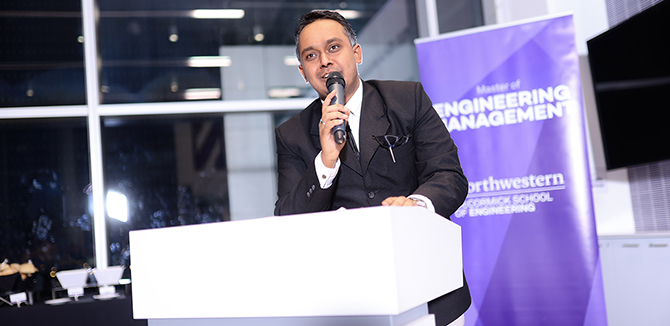Leading as a Technical Program Manager at Google
Azgar Ali (MEM ‘22) talks about the difference between program managers and project managers and explains how MEM prepared him to excel in his current role.

Azgar Ali is often asked to explain the difference between a product manager and a program manager. In his eyes, the difference is like the difference between building a road and planning a highway system.
A road might be necessary to connect a subdivision to a business center, but if it’s built without thinking of its implications on all the other roads leading to, from, and around that business center, the result could be snarled traffic and disappointed stakeholders.
“On a broad level, a product manager identifies the needs of the customers and comes up with product ideas to meet those needs,” Ali said. “The program manager focuses on how to get the product or project delivered. A program can contain multiple projects that the program manager will be owning.”
Ali is a technical program manager at Google, a job he began the month after graduating from Northwestern's Master of Engineering Management (MEM) program. A technical program manager must have technical judgment in addition to program management skills, Ali said.
At Google, his job is to see the big picture of massive technological projects affecting billions of Google users around the world.
To do his job well, Ali (MEM '22) leans on the lessons he learned during his time in the MEM program. He said it was the program’s blend of the art of engineering management and the science that underpins it that first attracted him.
At Google, Ali sees the value the company provides its customers on a daily basis as its simple user experience is built on complex engineering tasks. He developed an increased appreciation for that marriage at Northwestern.
"The MEM program helps participants understand this fusion through the tools and frameworks it teaches and how to apply those learnings in the management context to tap maximum value," Ali said.
Beyond that recognition, Ali developed an array of other skills in MEM, including his confidence to face leadership challenges, his ability to lead with empathy, the mindset to take on complex projects, and and the desire to learn cutting-edge research findings in topics like marketing and social networks.
Ali routinely applies those lessons to his work.
"The leadership skills and communication techniques learned are applied while managing a diverse set of stakeholders," said Ali, who oversees a team of five project managers and multiple engineers. "The project management techniques are used in planning and resource optimization. I also have an opportunity to be part of the Google Enterprise Network leadership workgroup, where I work with a senior leadership team of directors and VPs to help come up with solutions to organizational management issues."
Ali came to the MEM program with nearly a decade of professional experience, the last 7 1/2 years as an engineer in India with the government of Karnataka’s department of science and technology. There, he worked at the Nehru Planetarium in Bangalore, a premier science center and incubation location for research and science outreach.
Now he is settled into his job at Google’s Austin, Texas, location. He said he’s been awed by exactly how far the program he’s responsible for reaches.
“The scale at which my work impacts and the sense of responsibility that comes with it is something that surprised me when I took up the role at Google,” he said. “What my team does directly impacts billions of users across the world. It is a humbling experience, while at the same time it keeps me always alert and mindful.”
Ali has seen the impact MEM had on his career and is a major advocate for future students to follow in his footsteps. He said the increasingly challenging economic environment should not be a deterrent to professionals looking to grow their careers.
“I would suggest candidates clearly understand why they want to pursue the MEM program,” he said. “The current economic environment is relatively uncertain. But a well-learned, relevant skill will always be useful if capitalized well. When pursuing programs like MEM, try to think long term.”

